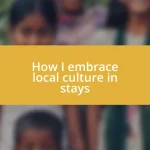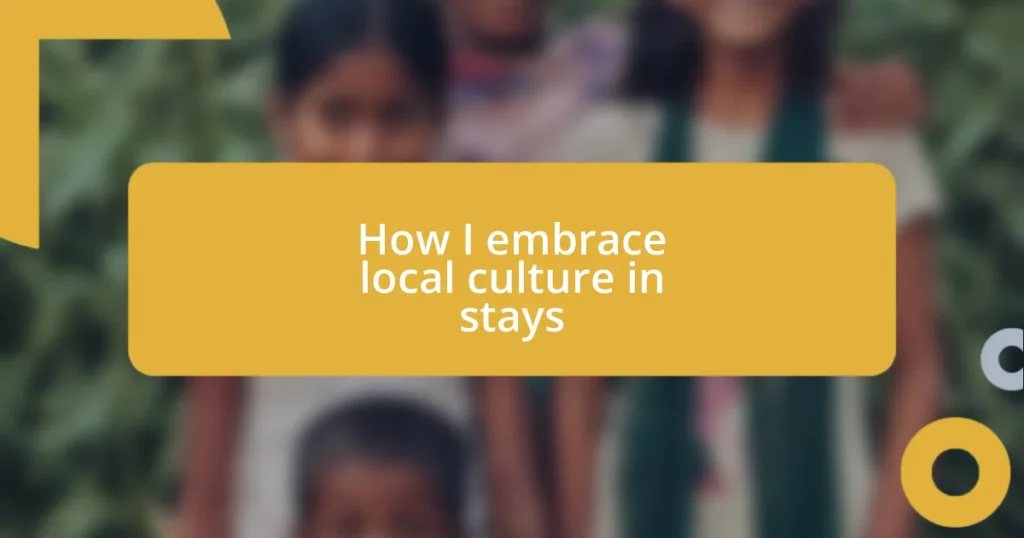Key takeaways:
- Engaging with local culture enhances travel experiences through authentic connections and deepens understanding of diverse traditions.
- Choosing culturally immersive accommodations and participating in local activities foster meaningful relationships with communities.
- Supporting local artisans and businesses not only enriches individual journeys but also contributes to preserving local heritage and economies.

Understanding local culture benefits
Understanding local culture offers a wealth of benefits that can enrich our travel experiences in meaningful ways. I remember one trip where I stayed with a host family in Thailand; they introduced me not just to their food, but to their way of life. Breaking bread together gave me a deeper appreciation for their traditions and values—something I never could have grasped from a tourist brochure alone.
When we dive into local customs, we also build authentic connections with the community. I often find that learning a few phrases in the local language opens doors I didn’t even know existed. Have you ever noticed how a simple “thank you” in the native tongue can bring a smile to someone’s face? It’s those little interactions that turn a transient visit into a cherished memory.
Additionally, embracing local culture can greatly enhance our understanding of global perspectives. I once attended a local festival in Mexico and was struck by how much joy and creativity were expressed through their dances and music. It made me reflect on my own cultural expressions. What might we learn from each other if we opened our minds and hearts to the beauty of different traditions? Engaging with local culture not only broadens our horizons but also fosters a sense of empathy and unity.
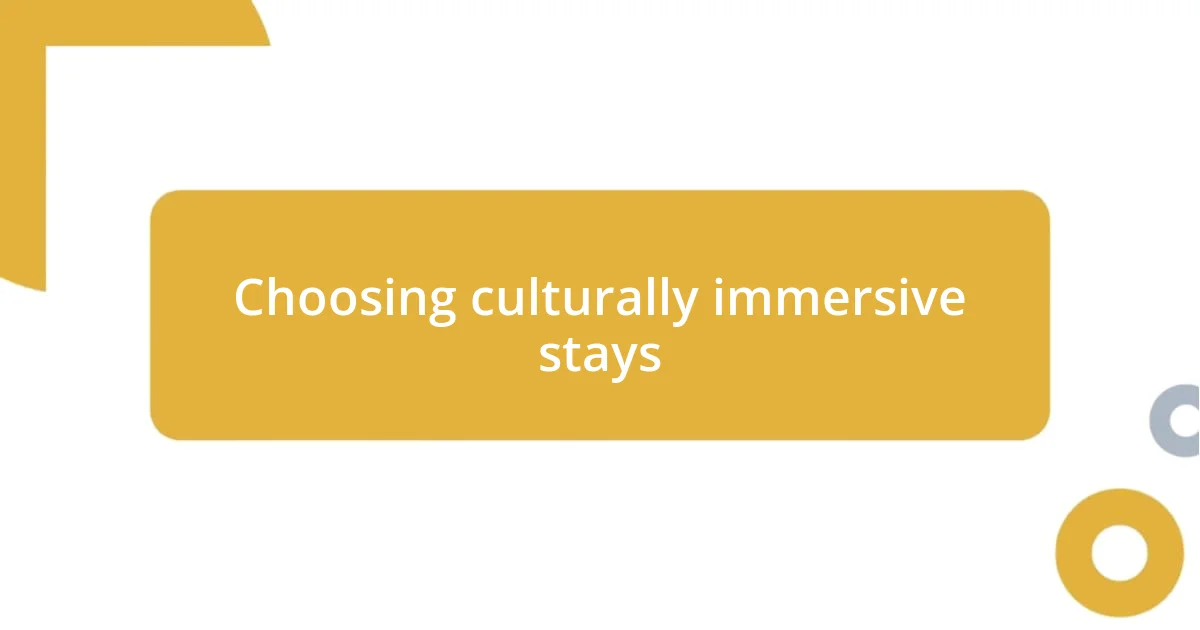
Choosing culturally immersive stays
Choosing culturally immersive stays can truly transform your travel experience. I still vividly remember my visit to a small village in Portugal, where I opted for a quaint homestay instead of a typical hotel. The charm of rustic life, complete with morning bread baking and local wine tastings, gave me a front-row seat to Portuguese traditions. I wasn’t merely a guest; I felt like part of a family, learning about their rituals and day-to-day life in a way that made every moment feel special.
When selecting accommodations that promise cultural immersion, consider the following:
- Look for family-run guesthouses or bed-and-breakfasts.
- Seek out options that offer cooking classes or workshops on local crafts.
- Research host family programs that prioritize cultural exchange.
- Read reviews from previous guests emphasizing local experiences.
- Choose lodgings close to community events or festivals.
These elements make a significant difference in how you engage with local culture, turning an ordinary trip into an unforgettable journey filled with genuine connections.
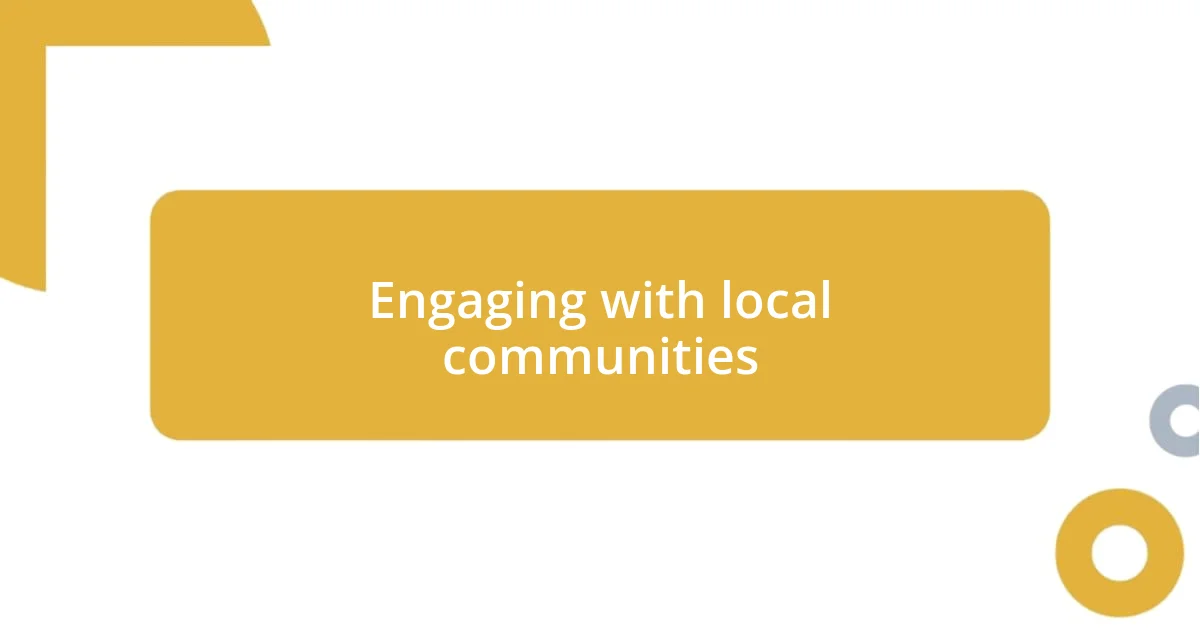
Engaging with local communities
Engaging with local communities is one of the highlights of my travels. I recall visiting a small fishing village in Italy where I joined the locals on their evening fishing trips. As the sun set, painting the sky in hues of orange and pink, I realized I wasn’t just an observer; I became a part of their world. Sharing stories and laughter with these fishermen not only enhanced my understanding of their livelihoods but also forged friendships that felt timeless.
Every community has unique customs that can enrich our experiences, and I’ve found that participating in local events is one of the best ways to connect. During a recent stay in India, I joined a Diwali celebration. The vibrant colors, sounds, and scents overwhelmed my senses in the best way possible. Lighting diyas (small oil lamps) alongside my newfound friends as we shared sweets was a moment that resonated deeply with me. It’s through these shared experiences that the barriers of being a tourist begin to dissolve.
I often think about how engaging with local communities can change our perspectives. While volunteering at a community garden in New Zealand, I discovered not just agricultural practices but also the stories behind every plant and every family involved. This hands-on experience made me appreciate the hard work and dedication that goes into preserving local traditions. Plus, the bonds formed while digging in the dirt created memories that I cherish to this day.
| Type of Engagement | Personal Experience |
|---|---|
| Participating in Local Traditions | Lighting diyas during Diwali with new friends in India |
| Attending Community Events | Joining fishermen in Italy for evening fishing trips |
| Volunteering | Working at a community garden in New Zealand |
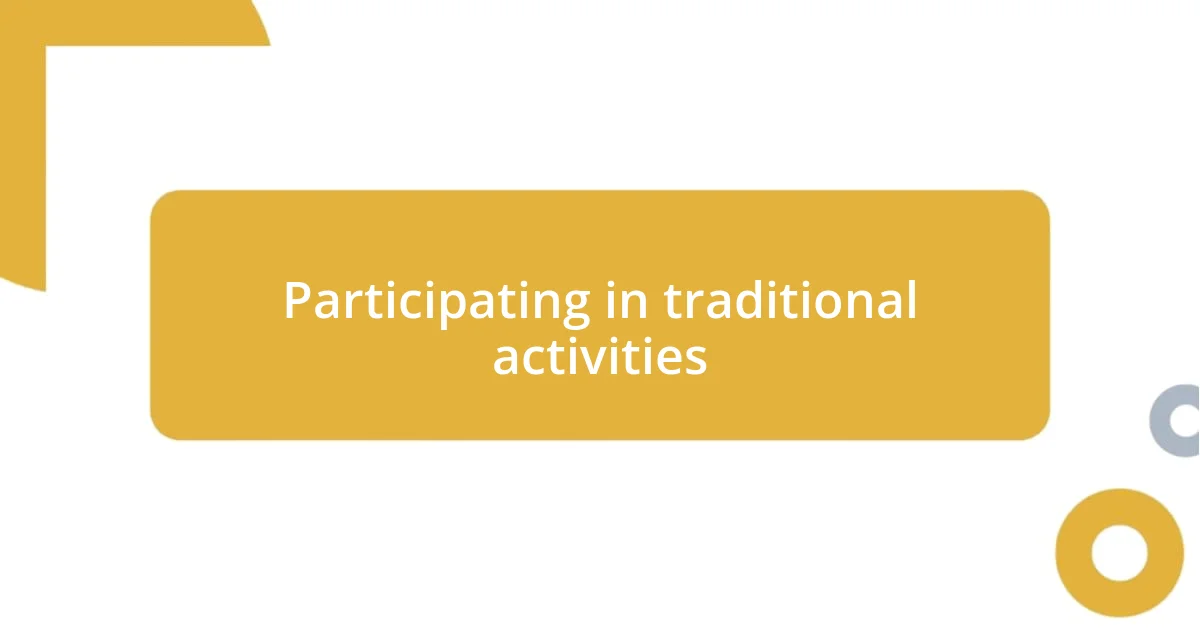
Participating in traditional activities
Participating in traditional activities is one of the most rewarding aspects of travel for me. During a visit to Thailand, I had the chance to engage in a local Muay Thai class. The energy in the gym was infectious as I followed the rhythm of the trainers, soaking in not just the techniques but the culture behind this revered martial art. It struck me how each punch and kick carried stories of resilience and community, leaving me with a profound respect for the sport and its importance in Thai culture.
I often seek out traditional festivals during my travels, as they offer a glimpse into the heart of a culture. In a small town in Mexico, I was fortunate to participate in a Day of the Dead celebration. Painting sugar skulls and decorating altars was more than just an activity; it was an emotional experience that connected me to the beliefs and values of the locals. As we shared stories of ancestors over marigold flowers, I felt a beautiful sense of unity and continuity. It made me reflect: how often do we celebrate our own traditions back home?
Recently, I embraced local customs by learning the art of traditional pottery in Japan. At a local studio, I immersed myself in the process, shaping clay while listening to the potter’s tales of heritage. It wasn’t just about creating a piece of art but understanding the meticulous traditions passed down through generations. I left the workshop not only with a handmade bowl but also with a piece of history and an appreciation for the craftsmanship that has endured through time. How often do we take the time to connect with such forms of creativity in our own lives?
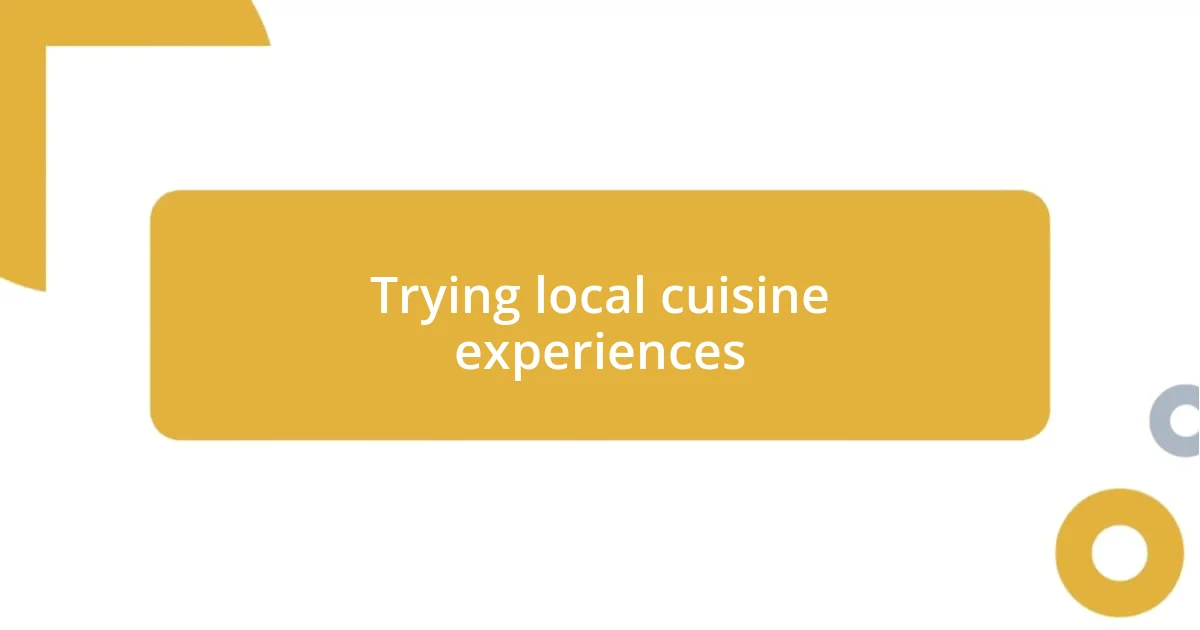
Trying local cuisine experiences
Trying local cuisine is an adventure that I always embrace on my travels. One unforgettable experience was at a street market in Bangkok, where I joined a local chef for a cooking class. As the sweet and spicy aromas enveloped me, I felt a deep sense of connection to the ingredients, each telling its own story. Cooking pad Thai from scratch wasn’t just about following a recipe; it was about understanding the traditions and flavors that define Thai culture.
During a romantic evening in Paris, I found myself savoring a meal at a bistro that had been in the community for generations. Sitting next to the locals, I ordered the coq au vin, and with each bite, I tasted not just food but the essence of French life. Sharing laughs with the waiter as he explained the dish made me realize something: food truly bridges cultures, and every meal has the power to showcase a unique narrative of a place.
Recently, in Oaxaca, Mexico, I stumbled upon a delightful taco stand, where the owner invited me behind the counter. I was intrigued to see how he prepared each taco meticulously, using fresh ingredients sourced from local farmers. As I filled my plate and stepped outside, the sun setting over vibrant street life, I couldn’t help but wonder—how often do we miss out on the richness of our environments? These culinary encounters not only filled my stomach but also my heart and spirit, deepening my appreciation for the local culture along the way.
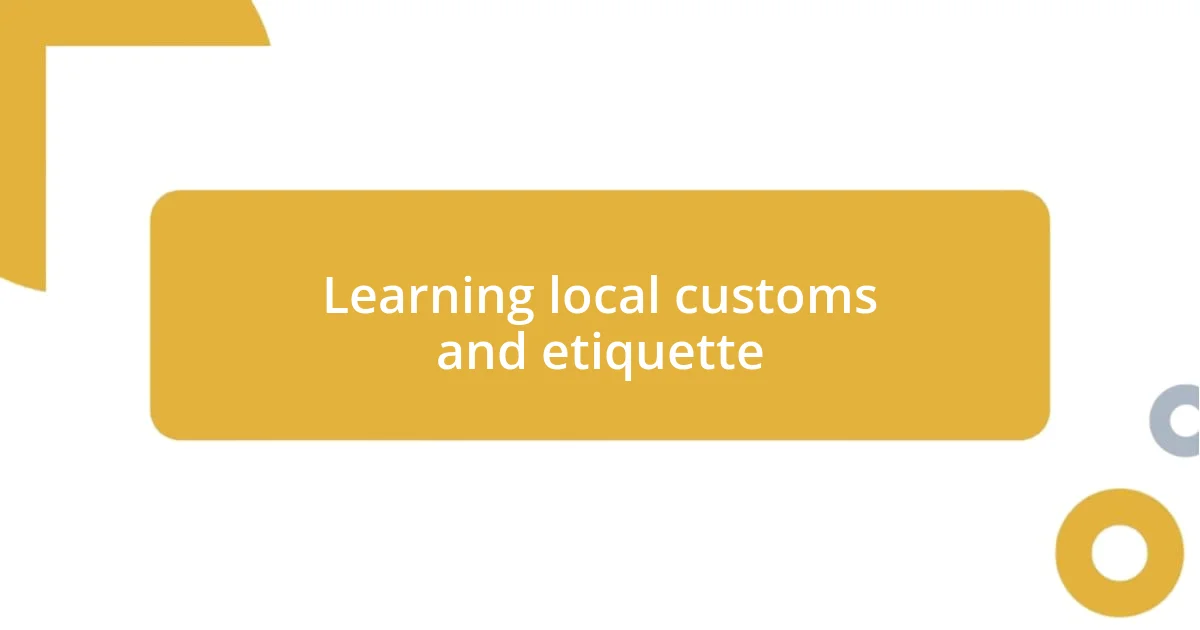
Learning local customs and etiquette
Understanding local customs and etiquette can transform a trip from a mere vacation into a profound cultural immersion. When I visited Indonesia, I learned the essential practice of “salam,” or the traditional greeting. The first time I encountered this, I was taken aback as locals clasped their hands together and nodded slightly in a show of respect. It made me realize that small gestures can hold deep meanings, often reflecting the values of the community.
I remember sitting in a traditional Balinese home, where my host explained the importance of taking off shoes before entering. It wasn’t just about cleanliness; it symbolized respect for the home and those within it. This simple act left me pondering: how many times do we inadvertently overlook the significance of our actions in different contexts? Embracing these customs allowed me to connect on a deeper level, making the experience far more enriching than I initially anticipated.
Another memorable moment was when I participated in a local family ceremony in Bhutan. As I followed the family’s lead in their customs, I was struck by their emphasis on community and spirituality. They expressed gratitude through prayers and offerings, fostering a sense of belonging that I had not felt before in my travels. Such experiences made me understand that by respecting and learning local customs, we not only enrich our own journeys but also honor the cultures we visit. It’s a beautiful reminder of how interconnected we can be, don’t you think?
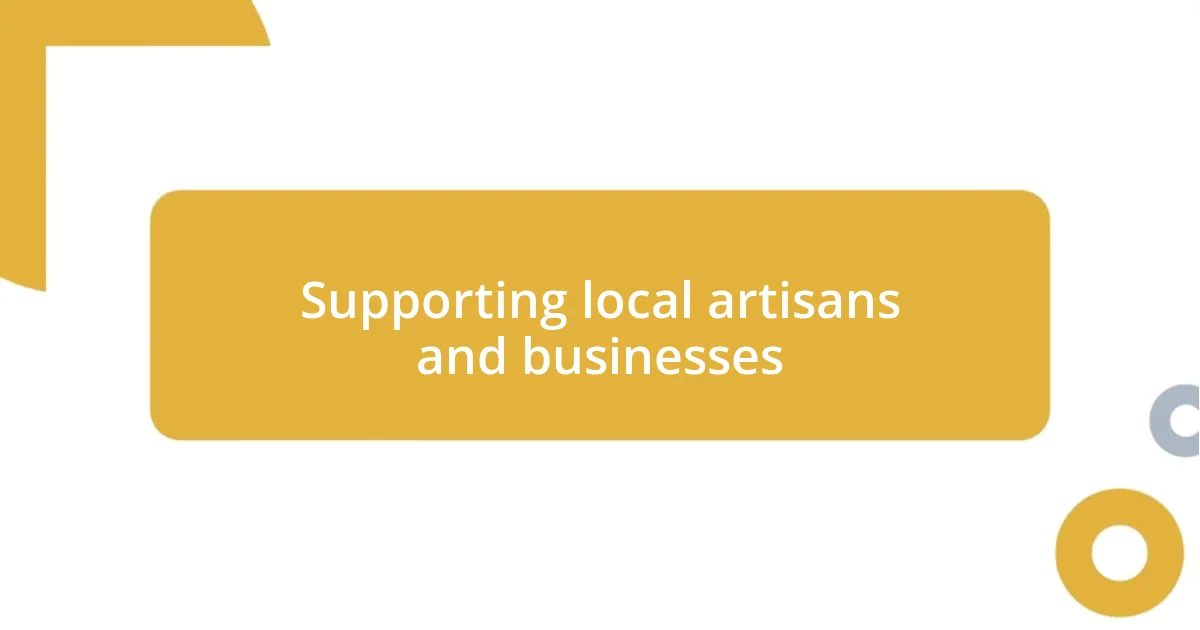
Supporting local artisans and businesses
Supporting local artisans and businesses is an incredible way to embrace the essence of a destination. I recall visiting a charming market in Santa Fe, where I met an artist named Maria who crafted stunning pottery. As she shared her creative process and the significance of traditional techniques passed down through generations, I felt an emotional connection not just to her work, but to the culture that shaped it. It struck me how purchasing a single piece could contribute to the livelihood of someone so passionate about their craft.
I once stumbled upon a small family-run bookstore in Lisbon, where the owner, an elderly gentleman, passionately shared stories of local authors. The warmth in his voice as he recounted tales behind each title resonated within me. I realized that by choosing to buy from him rather than a large chain store, I was preserving the soul of this vibrant neighborhood. Isn’t it fascinating how a simple act of buying can foster community spirit and sustain local heritage?
Engaging with local artisans not only enriches our travel experience but also reminds us of our interconnectedness. When I bought a handcrafted scarf from a woman in Morocco, she wrapped it around me with a smile, telling me how the colors were inspired by her childhood memories of the desert sunsets. I left feeling like I was taking a piece of her story with me. This sense of personal connection makes every interaction memorable and highlights the importance of supporting the heartbeat of the local economy. Don’t you think every destination has these hidden gems waiting to be discovered?

